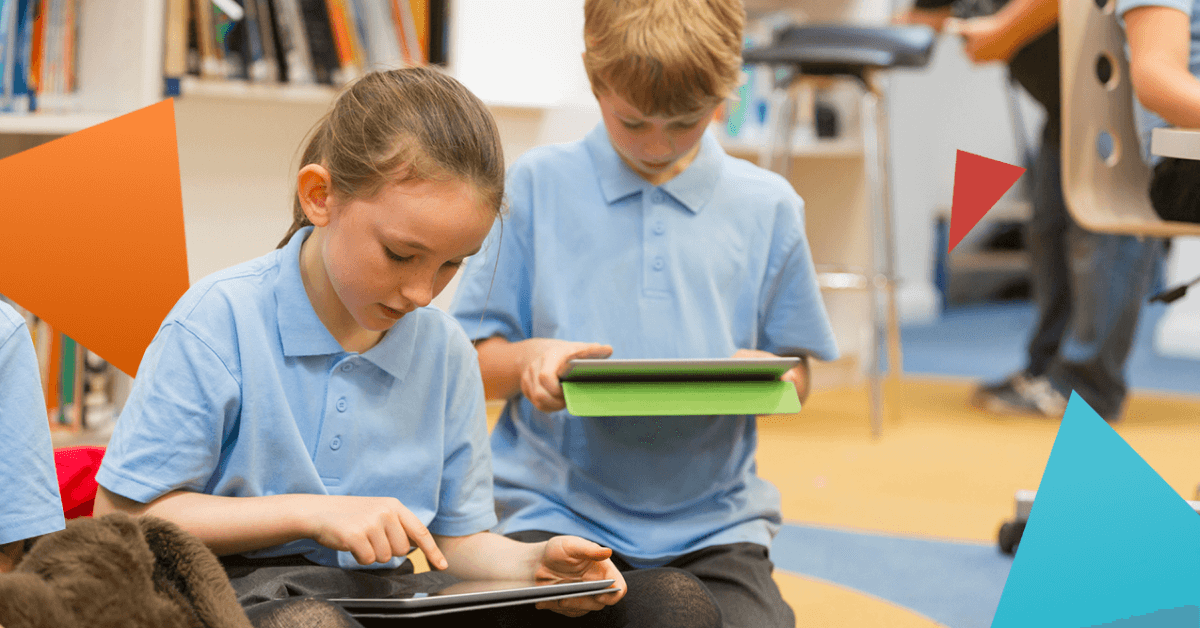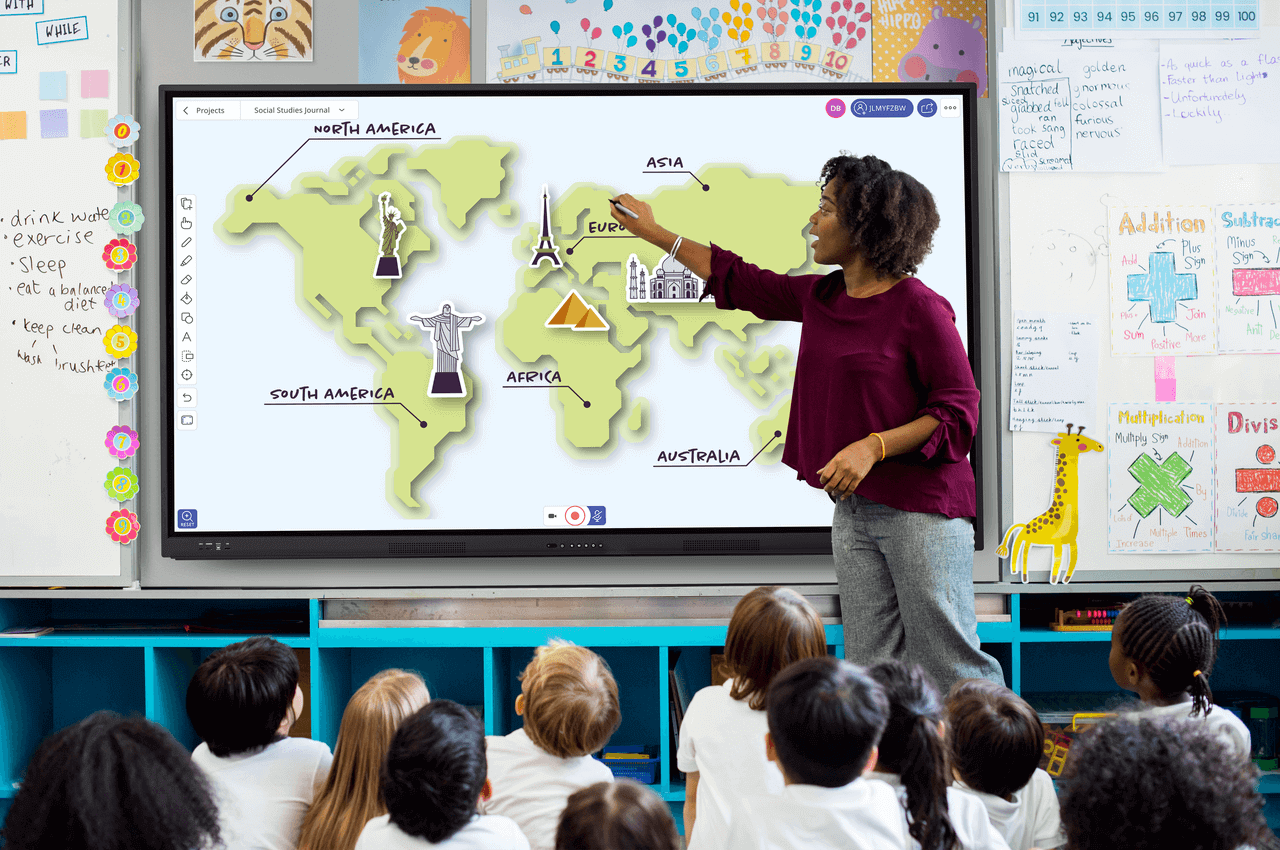Published on April 26th, 2022
12 Interactive Whiteboard Apps For English
14 minute read

Improving a child’s native language or helping them learn a new language needn’t be difficult – yet it often is. Thanks to the vast array of educational apps out there, learning and improving English can not only be made easy, but it can be made fun too.
Whether you’re teaching in the classroom or setting homework for your students, apps can be used to engage in ways that a textbook can’t.
Read on to find out more about our pick of the 12 of the best apps for learning English with the help of interactive displays.
1. BOOKR Class – KS2 & KS3
Made for teachers by teachers, BOOKR Class is an easy-to-use English language learning platform containing book assignments, activity tips, printables, reading statistics and automatic exercise correction. These make it ideal for both KS2 and KS3 levels.
It also offers a teacher’s dashboard, meaning educators can keep up with student engagement, and it’s perfect for learning in an interactive and engaging setting, either remotely or in class.
BOOKR Class uses animations and illustrations to promote an authentic understanding of English texts, and multiple games on offer make linguistic practice both entertaining and stimulating.
Like many apps for learning English on the list, the BOOKR Class app is available for free for 14 days for educators or school leaders.
2. Lingokids – KS2
It takes a lot of patience to learn a language, which is why Lingokids strives to make learning English a fun, informal experience. On top of learning English words and English grammar, Lingokids users can also improve their maths skills with fun puzzles too.
A Parent’s Community allows guardians to check in with what their child is learning. As well as this, the app is promoted as being 100% safe for children, with all activities teacher-approved, and much of the material used comes from Oxford University Press.
Lingokids Basic is one of only a few completely free English learning apps, while Lingokids Unlimited charges a small subscription fee each month.
3. Duolingo ABC – KS1
Duolingo ABC is one of the most popular language-learning apps amongst parents and educators alike when teaching both native English speakers and those for whom English is a foreign language.
The app has over 300 lessons, each equipped with interactive learning to accurately build confidence in using the English vocabulary and promote a basic understanding of conversational English in foreign speakers. There are also printable activities to help children build confidence and fluency when learning English.
The app is 100% free anytime.
4. EWA Kids: English for Children – KS1
Ideal for children aged 5-12 years old, EWA Kids is a flexible, interactive platform for English learners, where children explore and learn English through gamification, illustrated texts and clean pronunciation samples.
The app has over 1000 flashcards included and hundreds of specially adapted children’s books – all with an easy one-tap translation.
It’s safe for children to use on their own with no advertisements throughout, and the creators, EWA: Learn Languages, state that children can reach a notable level of spoken English in as little as one month with regular use of the app.
The app is available online, with free trials often being offered.
5. Kid Family English – KS1 & KS2
Kid Family English learning app takes a story-based learning approach to English courses. There are over 8 hours of native-speaker audio which make for effective and informal learning for all ages, but the app is primarily suited to young children who need to improve their English language skills.
There is also an emphasis placed on spoken English, with learners being given ample opportunity to showcase their verbal skills and any new words learned as well as giving them the confidence to answer questions in English quickly, without hesitation and accurately.
Full of humorous stories which incorporate grammar lessons, the Kid Family English learning app is considered one of the best apps specialising in English lessons for a young age group. Worksheets are offered for an additional fee in which teachers and educators can track their students’ progress.
6. ABC Kids – Tracing & Phonics
Bets suited to children up to 8 years of age, ABC Kids is a fun, free and educational way for young learners to hone their English language practice while enjoying the experience of new challenges by using the whiteboard pen to trace the shapes of the English alphabet.
They can also phonetically match words and letters in order to gain confidence in learning English and grow their vocabulary at a faster pace.
Teachers can keep track of student progress by using Teaching Mode, where they can access report cards and toggle tracing.
ABC Kids is a completely free app with no in-app purchases and zero ads throughout, so children can enjoy learning free from distraction.
7. Night Zookeeper – KS1 & KS2
“Inspire a love of writing” is the motto of Night Zookeeper, an app designed for learners ages up to 11 years old or Key Stage 2 level to practice English and expand their learning into creative writing.
Developers of these KS2 English apps say that children can get to grips with the complexities of the English language at a faster speed than they ordinarily would.
Night Zookeeper is based on a series of storybooks that help boost children’s vocabulary, spelling and grammar, as well as spark their imagination in order for them to write inspired, creative stories, thus promoting their English.
Learners receive feedback on their stories from the characters in the book series, as well as personalised feedback from the Night Zookeeper team of educators.
Night Zookeeper comes with a 14-day free trial.
8. Reading Eggs – KS 1 – 3
Reading Eggs is an educational app tailored to students of all ages, with its creators stating that younger children can learn to read in as little as 30 days thanks to the app. In fact, those English native speakers who used the app throughout the COVID-19 lockdowns were more likely to improve by a whole grade level!
Packed with songs and interactive games, learners are rewarded with golden eggs when they hit a milestone, adding a fun and motivational aspect for English language learners. Reading Eggs boosts confidence in reading and writing to students whose own language is English (while also having sections dedicated to Mathematics), with structured one-on-one lessons dealing with phonetics and sight words
A 30-day free Reading Eggs trial is offered to educators.
9. Hello English Kids – KS1
Hello English Kids is a programme to help KS1 students with alphabet recognition and add new vocabulary and basic conversational skills, allowing them to learn English easily via nursery rhymes, animated stories, and line tracing.
There’s a control feature meaning that the educator can always stay in control while being fully aware of what their students are doing online. There are detailed reports, which will regularly update to show how their English speaking practice, reading and writing are improving.
10. Letter School – KS1
An excellent resource for children where English isn’t necessarily their native language, Letter School is a popular language app used by educators all over the world.
While so many apps focus on general English speaking and learning, Letter School follows your curriculum of choice, helping younger learners speak English faster than with traditional learning methods.
Its effective learning methods include bite-sized lessons filled with new words, video lessons, grammar explanations and speaking practice, as well as improving listening skills, making this one of the best apps for learning English.
11. Accomplish Reading – KS1 & KS2
Students can learn and prove their English the easy way with Accomplish Reading, a programme that allows both KS1 and KS2 students, as well as older children, to increase their reading comprehension. The app teaches the importance of re-reading, a vital learning approach when it comes to exams.
The app for English KS2 students is also a great resource to be used when implemented with a whiteboard, meaning large groups of students can easily learn together in a collaborative environment.
Feedback is immediate, taking some of the focus away from educators, with the app acting as a personal tutor.
12. Gojimo – GCSE English App
Last on our list of the best English apps is Gojimo, a GCSE English app.
Gojimo is a fun app that highlights grammar mistakes and generally improves overall English skills amongst GCSE-level children.
While it isn’t generally considered suitable to learn English with, it does provide older students with a range of English revision tips, as well as lots of English Literature notes, hints, tips and exam practice – it’s the perfect GCSE English app for revision!
In fact, there are over 160,000 resources for students, covering not just English, but Maths, Physics and Biology too. It’s one of those incredible apps that help with GCSE English and any other subject your students are struggling with!
Why use English learning apps in the classroom?
Language apps offer a host of benefits when incorporated with interactive whiteboards, including:
- Allowing teachers to easily manage classes
- Connecting more with students
- Receiving access to material that might not otherwise be available
- Promoting education and learning English whilst having fun
- Helping atypical learners to thrive while hitting their potential in a fun, flexible and creative environment.
Other resources for English lessons from Promethean
Whatever you’re planning for your students, we can help. We’ve created resources to help with your lesson plans for English and the other core subjects.
- The ultimate list of classroom games
- English games for KS3
- English games for KS2
- Our favourite classroom quiz games and apps
- The best English quizzes
- Science apps for kids
- Maths apps for kids
If you have enjoyed this guide, why not check out some of our other expert interactive whiteboard resources.
Enhance your lessons with English learning apps on interactive whiteboards
There’s no denying that interactive whiteboards are a top-rated learning resource throughout schools worldwide, providing different types of learners with a variety of effective means of interaction and participation. Above everything, it makes learning languages – something traditionally seen as laborious – a fun and engaging process.
Why not contact us at Promethean for more information on how interactive displays could be the perfect resource for your students and educators? Or, you can request your very own free demo today.




